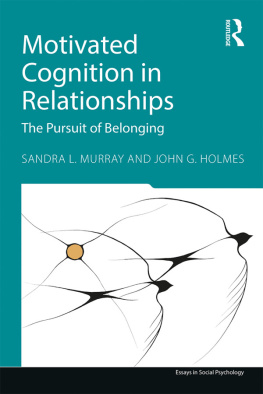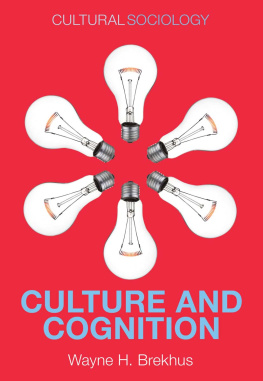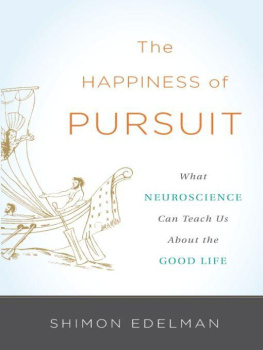Murray Sandra L. - Motivated Cognition in Relationships: In Pursuit of Safety and Value
Here you can read online Murray Sandra L. - Motivated Cognition in Relationships: In Pursuit of Safety and Value full text of the book (entire story) in english for free. Download pdf and epub, get meaning, cover and reviews about this ebook. year: 2017, publisher: Routledge, genre: Politics. Description of the work, (preface) as well as reviews are available. Best literature library LitArk.com created for fans of good reading and offers a wide selection of genres:
Romance novel
Science fiction
Adventure
Detective
Science
History
Home and family
Prose
Art
Politics
Computer
Non-fiction
Religion
Business
Children
Humor
Choose a favorite category and find really read worthwhile books. Enjoy immersion in the world of imagination, feel the emotions of the characters or learn something new for yourself, make an fascinating discovery.
- Book:Motivated Cognition in Relationships: In Pursuit of Safety and Value
- Author:
- Publisher:Routledge
- Genre:
- Year:2017
- Rating:3 / 5
- Favourites:Add to favourites
- Your mark:
- 60
- 1
- 2
- 3
- 4
- 5
Motivated Cognition in Relationships: In Pursuit of Safety and Value: summary, description and annotation
We offer to read an annotation, description, summary or preface (depends on what the author of the book "Motivated Cognition in Relationships: In Pursuit of Safety and Value" wrote himself). If you haven't found the necessary information about the book — write in the comments, we will try to find it.
Motivated Cognition in Relationships: In Pursuit of Safety and Value — read online for free the complete book (whole text) full work
Below is the text of the book, divided by pages. System saving the place of the last page read, allows you to conveniently read the book "Motivated Cognition in Relationships: In Pursuit of Safety and Value" online for free, without having to search again every time where you left off. Put a bookmark, and you can go to the page where you finished reading at any time.
Font size:
Interval:
Bookmark:

p.i
MOTIVATED COGNITION IN RELATIONSHIPS
How can newlyweds believe they will be together forever, while knowing that the majority of marriages end in divorce? Why do people who desperately want to be loved end up alienating those who love them? How can partners that seem like complete opposites end up blissfully happy? This volume explores such fascinating questions. Murray and Holmes outline how basic motivations to be safe from being hurt and find value and meaning control how people feel, think, and behave in close relationships. Additionally, the authors highlight how these motivations infuse romantic life through succinct and accessible descriptions of cutting-edge empirical research and vivid evolving stories of four couples confronting different challenges in their relationship. Integrating ideas from the interdependence, goals, and embodiment literatures, this book puts a provocative new spin on seminal findings from two decades of collaborative research.
The book:
provides a new, interdependence-based, perspective on motivated cognition in close relationships;
advances a dyadic perspective that explores how motivation shapes perception and cognition in ways that result in motivation-consistent behavior;
examines how goal-driven cognition translates a persons wishes, desires, and preferences into judgment and behavior, and ultimately, his or her romantic partners relationship reality;
offers a refreshing argument that the ultimate effects of motivated cognition on satisfaction and stability depend on whether the motivations which most frequently guide perception and cognition match the reality constraints imposed by the perceiver, the partner, and the characteristics of the relationship.
p.ii
This book is essential for social and personality psychologists and will also be valuable to clinical psychologists and clinicians who work directly with couples to effect happier and more stable relationships. Advanced undergraduate and graduate students will find it a highly engaging compendium for understanding how motivation shapes affect, cognition, and behavior in close relationships.
p.iii
MOTIVATED
COGNITION IN
RELATIONSHIPS
The Pursuit of Belonging
Sandra L. Murray
John G. Holmes

p.iv
First published 2017
by Routledge
711 Third Avenue, New York, NY 10017
and by Routledge
2 Park Square, Milton Park, Abingdon, Oxon, OX14 4RN
Routledge is an imprint of the Taylor & Francis Group, an informa business
2017 Taylor & Francis
The right of Sandra L. Murray and John G. Holmes to be identified as the authors of this work has been asserted by them in accordance with sections 77 and 78 of the Copyright, Designs and Patents Act 1988.
All rights reserved. No part of this book may be reprinted or reproduced or utilized in any form or by any electronic, mechanical, or other means, now known or hereafter invented, including photocopying and recording, or in any information storage or retrieval system, without permission in writing from the publishers.
Trademark notice: Product or corporate names may be trademarks or registered trademarks, and are used only for identification and explanation without intent to infringe.
Library of Congress Cataloging in Publication Data
A catalog record for this book has been requested
ISBN: 978-1-84871-519-6 (hbk)
ISBN: 978-1-84872-520-1 (pbk)
ISBN: 978-1-315-22548-7 (ebk)
Typeset in Bembo
by Swales & Willis, Exeter, Devon, UK
p.v
We dedicate this book to Colin, Derek, and Lynda.
p.viii
We are tremendously grateful to the many students and research colleagues who enriched the research we describe in this book. Their names populate the pages that follow. We also owe a special debt to Ziva Kunda, whose theorizing defined our thinking about motivated cognition. Memories of her as a mentor, colleague, and friend continue to inspire us today. We are also grateful to Monica Biernat for her astute editorial counsel. A National Science Foundation awarded to S. L. Murray (BCS-1143747) supported the preparation of this book.
p.ix
Sandra L. Murray is a Professor of Psychology at the University at Buffalo, the State University of New York. Her research examines the automatic and controlled processes involved in the regulation of self-esteem, trust, and commitment in relationships. Her scholarship has received multiple awards, including Mid-Career Distinguished Contribution Awards from the International Association of Relationships Research (2016) and the Society of Experimental Social Psychology (2012), Early Career Distinguished Contribution Awards from the American Psychological Association (2003) and the International Society of Self and Identity (2001), and Best New Contribution Awards from the Society of Personality and Social Psychology (2007) and the International Society for the Study of Personal Relationships (1998, 2000). Her research has been supported by grants from the National Institute of Mental Health and the National Science Foundation. She has held Associate Editor positions at Personality and Social Psychology Review , Journal of Personality and Social Psychology , and Journal of Experimental Social Psychology .
John G. Holmes is a Professor of Psychology at the University of Waterloo, Ontario, Canada. His research focuses on the cognitive and motivational processes involved in perceiving anothers motives. His teaching and scholarship have received multiple awards, including the Distinguished Career Award (2016) and Distinguished Mentoring Award (2004) from the International Association of Relationships Research, Best New Contribution Awards from the Society of Personality and Social Psychology (2007) and the International Society for the Study of Personal Relationships (1992, 1998, 2000), a commemorative page on the Heritage Wall of Fame (2014), and a University Research Chair from his home institution (20042012). His research has been supported by grants from the Social Sciences and Humanities Research Council of Canada and he served as an Associate Editor at Journal of Personality and Social Psychology .
p.1
Love is a canvas furnished by Nature and embroidered by imagination.
Voltaire
There is always some madness in love. But there is also always some reason in madness.
Friedrich Nietzsche, On Reading and Writing
Love is not blind it sees more, not less. But because it sees more, it is willing to see less.
Rabbi Julius Gordon
Love is an irresistible desire to be irresistibly desired.
Robert Frost
Nothing takes the taste out of peanut butter quite like unrequited love.
Charles M. Schulz, Charlie Brown in Peanuts
Social philosophers have long taken pen to paper to try to capture the essence of romantic love. Even the most haphazard samplings of their musings reveal the shared belief that love involves more than meets the eye. Falling in and out of love is thought to be transformative turning what meets the eye into something that pleases or displeases the eye or even the taste buds (as in the case of the crestfallen Charlie Brown).
This process of transformation is the topic of this book. The idea that love transforms perception, cognition, and behavior is no stranger to anyone who has ever been in love or to anyone who has ever given advice to anyone who has ever been in love. It is certainly no stranger to social psychologists. Scholars of motivated cognition now take it as a given that personal wishes, desires, and preferences color the inferences people make about the social world (Balcetis & Dunning, 2010; Kunda, 1990).
Next pageFont size:
Interval:
Bookmark:
Similar books «Motivated Cognition in Relationships: In Pursuit of Safety and Value»
Look at similar books to Motivated Cognition in Relationships: In Pursuit of Safety and Value. We have selected literature similar in name and meaning in the hope of providing readers with more options to find new, interesting, not yet read works.
Discussion, reviews of the book Motivated Cognition in Relationships: In Pursuit of Safety and Value and just readers' own opinions. Leave your comments, write what you think about the work, its meaning or the main characters. Specify what exactly you liked and what you didn't like, and why you think so.













